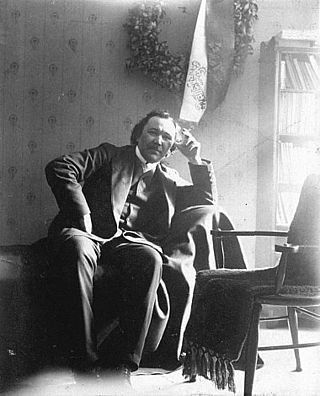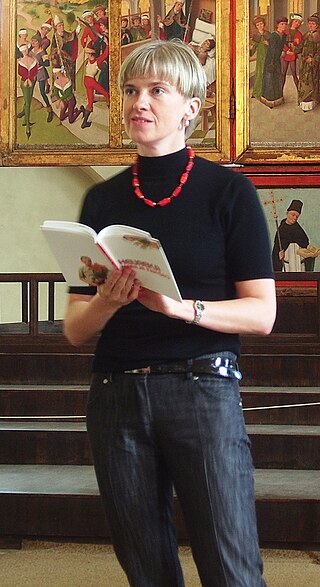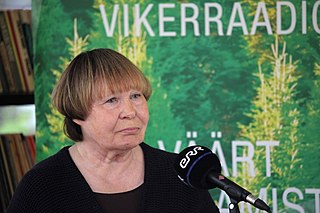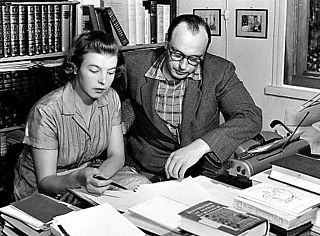
Eino Leino was a Finnish poet and journalist who is considered one of the pioneers of Finnish poetry and a national poet of Finland. His poems combine modern and Finnish folk elements. Much of his work is in the style of the Kalevala and folk songs in general. Nature, love, and despair are frequent themes in Leino's work. He is beloved and widely read in Finland today.

Amir Or, is an Israeli poet, novelist, and essayist whose works have been published in more than 50 languages.

Finnish literature refers to literature written in Finland. During the European early Middle Ages, the earliest text in a Finnic language is the unique thirteenth-century Birch bark letter no. 292 from Novgorod. The text was written in Cyrillic and represented a dialect of Finnic language spoken in Russian Olonets region. The earliest texts in Finland were written in Swedish or Latin during the Finnish Middle Age. Finnish-language literature was slowly developing from the 16th century onwards, after written Finnish was established by the Bishop and Finnish Lutheran reformer Mikael Agricola (1510–1557). He translated the New Testament into Finnish in 1548.

Yurii Ihorovych Andrukhovych is a Ukrainian prose writer, poet, essayist, and translator. His English pen name is Yuri Andrukhovych.

Lithuanian literature concerns the art of written works created by Lithuanians throughout their history.
Hama Tuma is an Ethiopian poet and writer in the Amharic and English languages.

Forrest Gander is an American poet, translator, essayist, and novelist. The A.K. Seaver Professor Emeritus of Literary Arts & Comparative Literature at Brown University, Gander won the Pulitzer Prize for Poetry in 2019 for Be With and is chancellor of the Academy of American Poets and a member of the American Academy of Arts and Sciences.

Danish literature a subset of Scandinavian literature, stretches back to the Middle Ages. The earliest preserved texts from Denmark are runic inscriptions on memorial stones and other objects, some of which contain short poems in alliterative verse. In the late 12th century Saxo Grammaticus wrote Gesta Danorum. During the 16th century, the Lutheran Reformation came to Denmark. During this era, Christiern Pedersen translated the New Testament into Danish and Thomas Kingo composed hymns. Fine poetry was created in the early 17th century by Anders Arrebo (1587–1637). The challenges faced during Denmark's absolute monarchy in 1660 are chronicled in Jammersminde by Leonora Christina of the Blue Tower. Ludvig Holberg (1684–1754), influenced by the ideas of the Enlightenment and Humanism, is considered the founder of modern Danish and Norwegian literature. Neoclassical poetry, drama, and the essay flourished during the 18th century influenced by French and English trends. German influence is seen in the verse of the leading poets of the late 18th century such as Johannes Ewald and Jens Baggesen. Other 18th century writers include the hymn writer Hans Adolph Brorson and the satirical poet Johan Herman Wessel.
Christopher Meredith FLSW is a poet, novelist, short story writer, and translator from Tredegar, Wales.
Jouni Mikael Inkala was born on 15 April 1966, in Kemi, Finland. Until the year 2005 he had published seven collections of poems of which the latest were Kirjoittamaton and Sarveisaikoja. Jouni Inkala encounters Anton Chekhov, Joseph Brodsky and Ludwig Wittgenstein, among others, in his collection of poetry Kirjoittamaton which approaches its semi-fictional subjects with sharp twists and sarcastic asides.

Kirmen Uribe is a Basque language writer. He won the National Prize for Literature in Spain in 2009 for his first novel Bilbao-New York-Bilbao, which has been translated into over 15 languages. His poetry collection Meanwhile Take My Hand, translated into English by Elizabeth Macklin, was a finalist for the 2008 PEN Award for Poetry in Translation. His works have been published in The New Yorker, Open City and Little Star.
Estonian literature is literature written in the Estonian language The domination of Estonia after the Northern Crusades, from the 13th century to 1918 by Germany, Sweden, and Russia resulted in few early written literary works in the Estonian language. The oldest records of written Estonian date from the 13th century. Originates Livoniae in Chronicle of Henry of Livonia contains Estonian place names, words and fragments of sentences. The Liber Census Daniae (1241) contains Estonian place and family names. The earliest extant samples of connected Estonian are the so-called Kullamaa prayers dating from 1524 and 1528. The first known printed book is a bilingual German-Estonian translation of the Lutheran catechism by S.Wanradt and J. Koell (1535). For the use of priests an Estonian grammar was printed in German in 1637. The New Testament was translated into southern Estonian in 1686. The two dialects were united by Anton Thor Helle in a form based on northern Estonian. Writings in Estonian became more significant in the 19th century during the Estophile Enlightenment Period (1750–1840).

Maarja Kangro is an Estonian poet, short story writer, novelist, essayist, nonfiction writer and librettist.

Viivi Luik is an Estonian writer and poet.
Parnasso is a literary magazine published in Helsinki, Finland. The magazine has been in circulation since 1951. It is among the most respected literary magazines in the country.

Kaarlo Sarkia was a Finnish poet and translator who was influenced by romantic poetry. His poems include motifs like childhood memories, love, landscapes and dreamworld, and in his last collection of poetry also his personal death and mankind's sufferings. Together with Uuno Kailas, Sarkia was the most prominent Finnish poet of the 1930s. As Kailas, his poetry also had homosexual themes.

AleksandrVadimovich Skidan is an author of Russian poetry and a translator of both American poetry and American and European literary theory. Skidan is known as one of Russia's most notable contemporary poets.

Ruth Helena Anhava was a prolific Finnish poet, author and translator. Her translations include novels, plays, lyrics and dozens of auditions.

Dražen Katunarić is a Croatian poet, essayist, novelist and editor.

Yuliya Musakovska is a Ukrainian poet and translator. She is the author of poetry collections such as “Exhaling, Inhaling” (2010), “Masks” (2011), “Hunting for Silence” (2014), “Men, Women and Children,” and “The God of Freedom” (2021) as well as two poetry chapbooks released in Poland and Sweden. Her poems have been translated into over thirty languages and widely published across the globe.















